Hao Yu
AfriqueLLM: How Data Mixing and Model Architecture Impact Continued Pre-training for African Languages
Jan 10, 2026Abstract:Large language models (LLMs) are increasingly multilingual, yet open models continue to underperform relative to proprietary systems, with the gap most pronounced for African languages. Continued pre-training (CPT) offers a practical route to language adaptation, but improvements on demanding capabilities such as mathematical reasoning often remain limited. This limitation is driven in part by the uneven domain coverage and missing task-relevant knowledge that characterize many low-resource language corpora. We present \texttt{AfriqueLLM}, a suite of open LLMs adapted to 20 African languages through CPT on 26B tokens. We perform a comprehensive empirical study across five base models spanning sizes and architectures, including Llama 3.1, Gemma 3, and Qwen 3, and systematically analyze how CPT data composition shapes downstream performance. In particular, we vary mixtures that include math, code, and synthetic translated data, and evaluate the resulting models on a range of multilingual benchmarks. Our results identify data composition as the primary driver of CPT gains. Adding math, code, and synthetic translated data yields consistent improvements, including on reasoning-oriented evaluations. Within a fixed architecture, larger models typically improve performance, but architectural choices dominate scale when comparing across model families. Moreover, strong multilingual performance in the base model does not reliably predict post-CPT outcomes; robust architectures coupled with task-aligned data provide a more dependable recipe. Finally, our best models improve long-context performance, including document-level translation. Models have been released on [Huggingface](https://huggingface.co/collections/McGill-NLP/afriquellm).
InfiniDepth: Arbitrary-Resolution and Fine-Grained Depth Estimation with Neural Implicit Fields
Jan 06, 2026Abstract:Existing depth estimation methods are fundamentally limited to predicting depth on discrete image grids. Such representations restrict their scalability to arbitrary output resolutions and hinder the geometric detail recovery. This paper introduces InfiniDepth, which represents depth as neural implicit fields. Through a simple yet effective local implicit decoder, we can query depth at continuous 2D coordinates, enabling arbitrary-resolution and fine-grained depth estimation. To better assess our method's capabilities, we curate a high-quality 4K synthetic benchmark from five different games, spanning diverse scenes with rich geometric and appearance details. Extensive experiments demonstrate that InfiniDepth achieves state-of-the-art performance on both synthetic and real-world benchmarks across relative and metric depth estimation tasks, particularly excelling in fine-detail regions. It also benefits the task of novel view synthesis under large viewpoint shifts, producing high-quality results with fewer holes and artifacts.
AI Code in the Wild: Measuring Security Risks and Ecosystem Shifts of AI-Generated Code in Modern Software
Dec 21, 2025
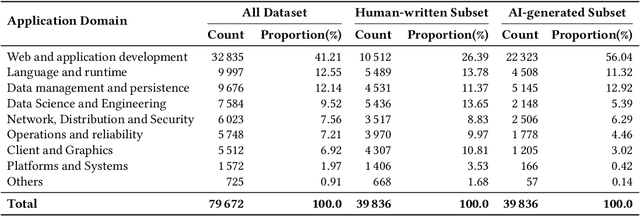

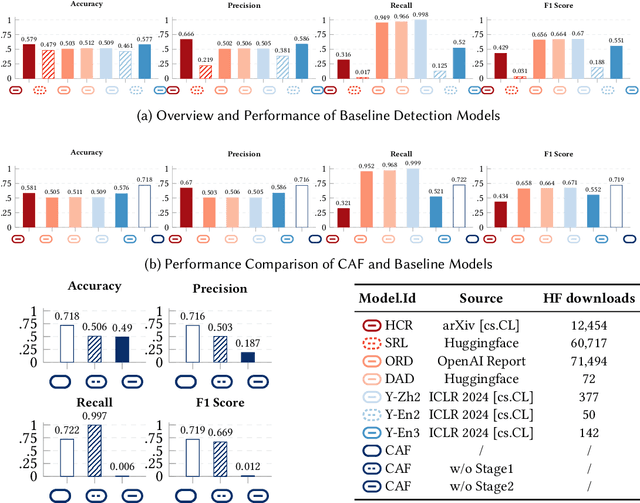
Abstract:Large language models (LLMs) for code generation are becoming integral to modern software development, but their real-world prevalence and security impact remain poorly understood. We present the first large-scale empirical study of AI-generated code (AIGCode) in the wild. We build a high-precision detection pipeline and a representative benchmark to distinguish AIGCode from human-written code, and apply them to (i) development commits from the top 1,000 GitHub repositories (2022-2025) and (ii) 7,000+ recent CVE-linked code changes. This lets us label commits, files, and functions along a human/AI axis and trace how AIGCode moves through projects and vulnerability life cycles. Our measurements show three ecological patterns. First, AIGCode is already a substantial fraction of new code, but adoption is structured: AI concentrates in glue code, tests, refactoring, documentation, and other boilerplate, while core logic and security-critical configurations remain mostly human-written. Second, adoption has security consequences: some CWE families are overrepresented in AI-tagged code, and near-identical insecure templates recur across unrelated projects, suggesting "AI-induced vulnerabilities" propagated by shared models rather than shared maintainers. Third, in human-AI edit chains, AI introduces high-throughput changes while humans act as security gatekeepers; when review is shallow, AI-introduced defects persist longer, remain exposed on network-accessible surfaces, and spread to more files and repositories. We will open-source the complete dataset and release analysis artifacts and fine-grained documentation of our methodology and findings.
VLCache: Computing 2% Vision Tokens and Reusing 98% for Vision-Language Inference
Dec 18, 2025Abstract:This paper presents VLCache, a cache reuse framework that exploits both Key-Value (KV) cache and encoder cache from prior multimodal inputs to eliminate costly recomputation when the same multimodal inputs recur. Unlike previous heuristic approaches, we formally identify the cumulative reuse error effect and demonstrate how to minimize the non-prefix cache reuse error effectively. We further analyze the varying importance of model layers and propose a dynamic, layer-aware recomputation strategy to balance accuracy and efficiency. Experimental results show that VLCache achieves an accuracy on par with full recomputation, while requiring only 2-5% of the tokens to compute, yielding 1.2x-16x TTFT speedups. We develop an experimental implementation of the proposed VLCache pipeline based on SGLang, enabling significantly faster inference in practical deployments.
A Trajectory-free Crash Detection Framework with Generative Approach and Segment Map Diffusion
Nov 17, 2025Abstract:Real-time crash detection is essential for developing proactive safety management strategy and enhancing overall traffic efficiency. To address the limitations associated with trajectory acquisition and vehicle tracking, road segment maps recording the individual-level traffic dynamic data were directly served in crash detection. A novel two-stage trajectory-free crash detection framework, was present to generate the rational future road segment map and identify crashes. The first-stage diffusion-based segment map generation model, Mapfusion, conducts a noisy-to-normal process that progressively adds noise to the road segment map until the map is corrupted to pure Gaussian noise. The denoising process is guided by sequential embedding components capturing the temporal dynamics of segment map sequences. Furthermore, the generation model is designed to incorporate background context through ControlNet to enhance generation control. Crash detection is achieved by comparing the monitored segment map with the generations from diffusion model in second stage. Trained on non-crash vehicle motion data, Mapfusion successfully generates realistic road segment evolution maps based on learned motion patterns and remains robust across different sampling intervals. Experiments on real-world crashes indicate the effectiveness of the proposed two-stage method in accurately detecting crashes.
Learning to Pose Problems: Reasoning-Driven and Solver-Adaptive Data Synthesis for Large Reasoning Models
Nov 13, 2025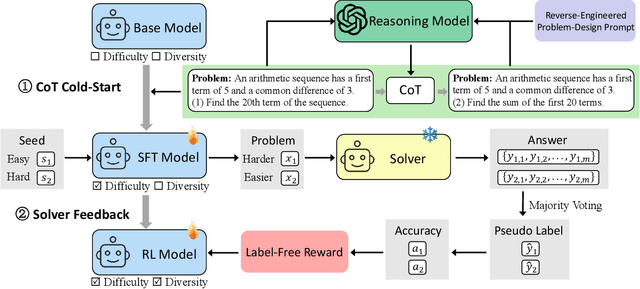
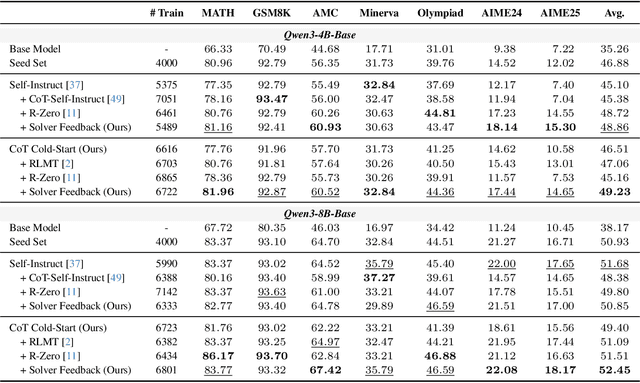
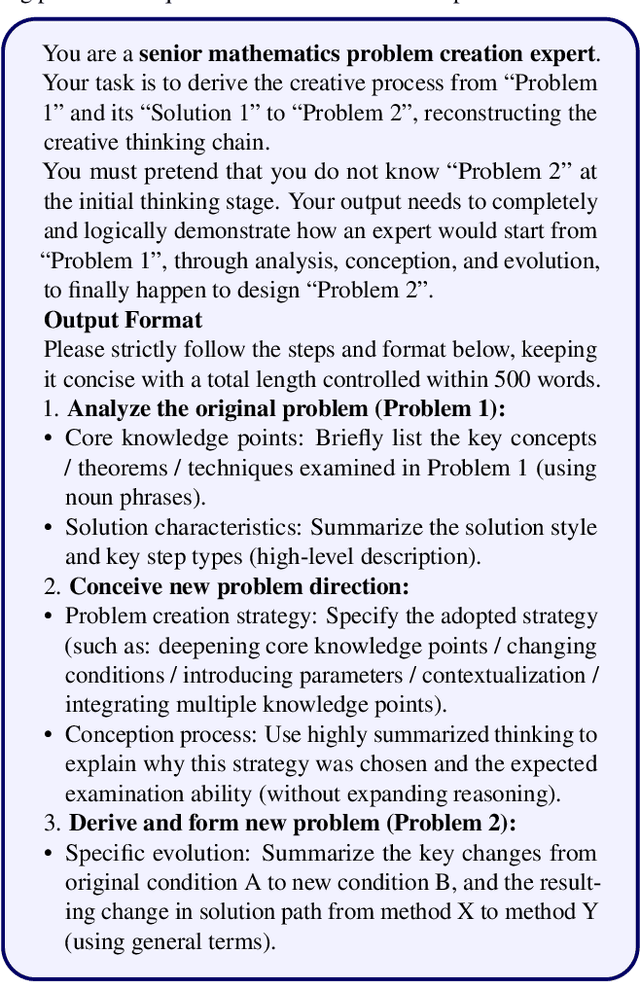
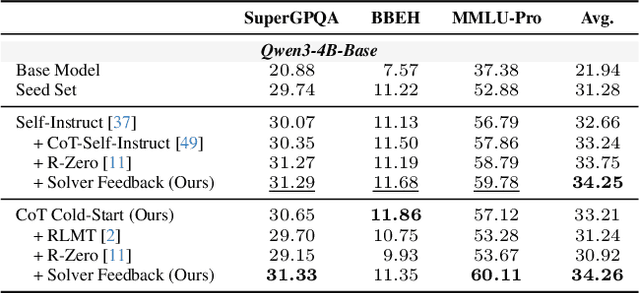
Abstract:Data synthesis for training large reasoning models offers a scalable alternative to limited, human-curated datasets, enabling the creation of high-quality data. However, existing approaches face several challenges: (i) indiscriminate generation that ignores the solver's ability and yields low-value problems, or reliance on complex data pipelines to balance problem difficulty; and (ii) a lack of reasoning in problem generation, leading to shallow problem variants. In this paper, we develop a problem generator that reasons explicitly to plan problem directions before synthesis and adapts difficulty to the solver's ability. Specifically, we construct related problem pairs and augment them with intermediate problem-design CoT produced by a reasoning model. These data bootstrap problem-design strategies from the generator. Then, we treat the solver's feedback on synthetic problems as a reward signal, enabling the generator to calibrate difficulty and produce complementary problems near the edge of the solver's competence. Extensive experiments on 10 mathematical and general reasoning benchmarks show that our method achieves an average improvement of 2.5% and generalizes to both language and vision-language models. Moreover, a solver trained on the synthesized data provides improved rewards for continued generator training, enabling co-evolution and yielding a further 0.7% performance gain. Our code will be made publicly available here.
AppForge: From Assistant to Independent Developer - Are GPTs Ready for Software Development?
Oct 09, 2025



Abstract:Large language models (LLMs) have demonstrated remarkable capability in function-level code generation tasks. Unlike isolated functions, real-world applications demand reasoning over the entire software system: developers must orchestrate how different components interact, maintain consistency across states over time, and ensure the application behaves correctly within the lifecycle and framework constraints. Yet, no existing benchmark adequately evaluates whether LLMs can bridge this gap and construct entire software systems from scratch. To address this gap, we propose APPFORGE, a benchmark consisting of 101 software development problems drawn from real-world Android apps. Given a natural language specification detailing the app functionality, a language model is tasked with implementing the functionality into an Android app from scratch. Developing an Android app from scratch requires understanding and coordinating app states, lifecycle management, and asynchronous operations, calling for LLMs to generate context-aware, robust, and maintainable code. To construct APPFORGE, we design a multi-agent system to automatically summarize the main functionalities from app documents and navigate the app to synthesize test cases validating the functional correctness of app implementation. Following rigorous manual verification by Android development experts, APPFORGE incorporates the test cases within an automated evaluation framework that enables reproducible assessment without human intervention, making it easily adoptable for future research. Our evaluation on 12 flagship LLMs show that all evaluated models achieve low effectiveness, with the best-performing model (GPT-5) developing only 18.8% functionally correct applications, highlighting fundamental limitations in current models' ability to handle complex, multi-component software engineering challenges.
How to Unlock Time Series Editing? Diffusion-Driven Approach with Multi-Grained Control
Jun 05, 2025Abstract:Recent advances in time series generation have shown promise, yet controlling properties in generated sequences remains challenging. Time Series Editing (TSE) - making precise modifications while preserving temporal coherence - consider both point-level constraints and segment-level controls that current methods struggle to provide. We introduce the CocktailEdit framework to enable simultaneous, flexible control across different types of constraints. This framework combines two key mechanisms: a confidence-weighted anchor control for point-wise constraints and a classifier-based control for managing statistical properties such as sums and averages over segments. Our methods achieve precise local control during the denoising inference stage while maintaining temporal coherence and integrating seamlessly, with any conditionally trained diffusion-based time series models. Extensive experiments across diverse datasets and models demonstrate its effectiveness. Our work bridges the gap between pure generative modeling and real-world time series editing needs, offering a flexible solution for human-in-the-loop time series generation and editing. The code and demo are provided for validation.
SCOUT: Teaching Pre-trained Language Models to Enhance Reasoning via Flow Chain-of-Thought
May 30, 2025Abstract:Chain of Thought (CoT) prompting improves the reasoning performance of large language models (LLMs) by encouraging step by step thinking. However, CoT-based methods depend on intermediate reasoning steps, which limits scalability and generalization. Recent work explores recursive reasoning, where LLMs reuse internal layers across iterations to refine latent representations without explicit CoT supervision. While promising, these approaches often require costly pretraining and lack a principled framework for how reasoning should evolve across iterations. We address this gap by introducing Flow Chain of Thought (Flow CoT), a reasoning paradigm that models recursive inference as a progressive trajectory of latent cognitive states. Flow CoT frames each iteration as a distinct cognitive stage deepening reasoning across iterations without relying on manual supervision. To realize this, we propose SCOUT (Stepwise Cognitive Optimization Using Teachers), a lightweight fine tuning framework that enables Flow CoT style reasoning without the need for pretraining. SCOUT uses progressive distillation to align each iteration with a teacher of appropriate capacity, and a cross attention based retrospective module that integrates outputs from previous iterations while preserving the models original computation flow. Experiments across eight reasoning benchmarks show that SCOUT consistently improves both accuracy and explanation quality, achieving up to 1.8% gains under fine tuning. Qualitative analyses further reveal that SCOUT enables progressively deeper reasoning across iterations refining both belief formation and explanation granularity. These results not only validate the effectiveness of SCOUT, but also demonstrate the practical viability of Flow CoT as a scalable framework for enhancing reasoning in LLMs.
Towards Efficient Key-Value Cache Management for Prefix Prefilling in LLM Inference
May 28, 2025Abstract:The increasing adoption of large language models (LLMs) with extended context windows necessitates efficient Key-Value Cache (KVC) management to optimize inference performance. Inference workloads like Retrieval-Augmented Generation (RAG) and agents exhibit high cache reusability, making efficient caching critical to reducing redundancy and improving speed. We analyze real-world KVC access patterns using publicly available traces and evaluate commercial key-value stores like Redis and state-of-the-art RDMA-based systems (CHIME [1] and Sherman [2]) for KVC metadata management. Our work demonstrates the lack of tailored storage solution for KVC prefilling, underscores the need for an efficient distributed caching system with optimized metadata management for LLM workloads, and provides insights into designing improved KVC management systems for scalable, low-latency inference.
 Add to Chrome
Add to Chrome Add to Firefox
Add to Firefox Add to Edge
Add to Edge